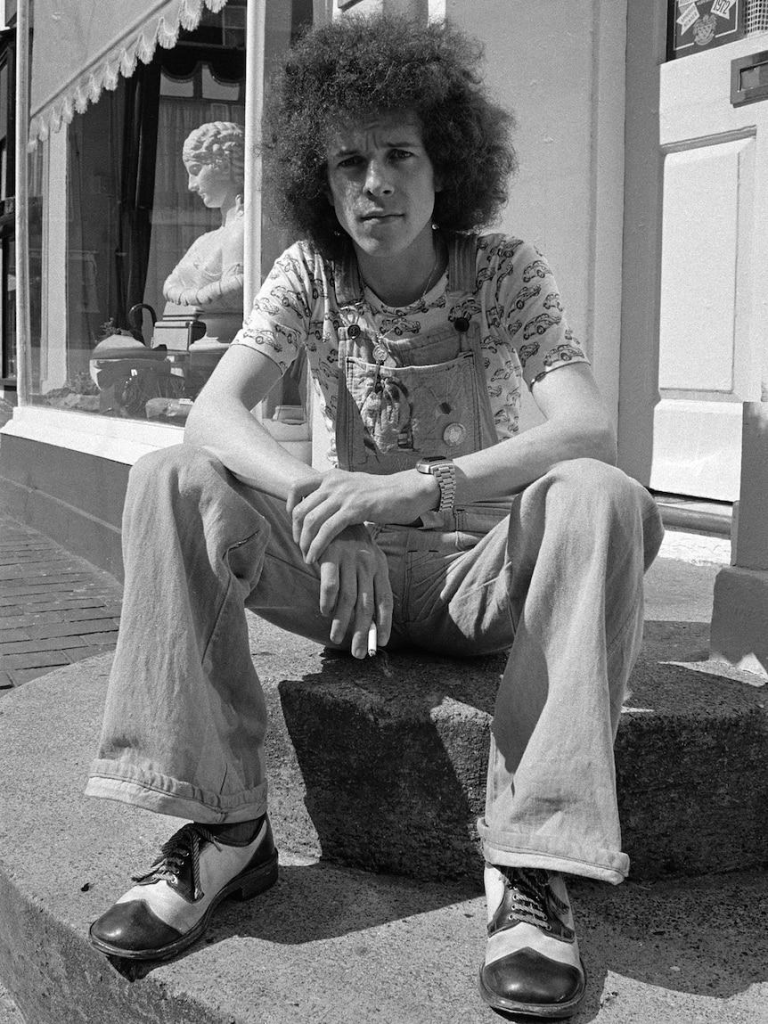“I look at my role as being a friend of Canberra Hospital, I can bring some pleasure and happiness sometimes to people who are really in difficult times in their lives.”
With backing music from a Bluetooth speaker, Sayer croons his way around the cancer wards, making a human connection with everyone he comes across.

Canberra Region Cancer Centre Operations Manager Caroline McIntyre says Sayer’s visits are typically kept a surprise for patients and staff.
“He’s always come in so discreetly,” she says.
“Normally it’s just very quiet, he comes up in the back lift and says hello to literally everybody.
“Some of them are doing it tough, and to have a little bit of joy and light – it really gives them a lift.
“What makes me happy is to see people getting chemo on their feet dancing.”
Jamming with Jimi Hendrix, Countdown and the Troubadour
Originally a graphic designer by trade, English-born Leo Sayer rose to pop prominence in London in the late 1960s, as a singer-songwriter – and was soon adopted by Australia as an honorary son after his first tour here in 1974.
He went on to become an Australian citizen in 2009.
Sayer was a regular on ABC TV’s Countdown during the 70s and 80s, performing chart-toppers like “You Make Me Feel Like Dancing”, “When I Need You”, “More Than I Could Say” and “Orchard Road”.

He blushingly admits they were wild days – when he didn’t always live up to his “good-guy” public persona.
“It was mad, I mean, Top of the Pops in England, Countdown over here,” he says.
“You were mobbed by the fans, I remember being dragged out of a limousine the first tour that I came here, and then speaking to crazy people like Molly Meldrum on TV and trying to sort of like take it all in.”
It seems hard to believe – the petite, well-spoken singer, with a mane of curly hair that inspired changing his name from Gerard to Leo – beating off mobs of screaming fangirls.
Sayer circulated in superstar company, becoming close friends with former Beatles George Harrison and Paul McCartney, collaborating with Roger Daltrey of The Who, and even sharing a sly cigarette or two with John Lennon and Yoko Ono who had a flat above his design studio.
“I met Jimi Hendrix right at the start of his career. I actually jammed with him, playing the harmonica, and him playing the guitar,” he says.
Recalling his 1975 opening night at the famous Troubadour Club in Los Angeles, he looked up to see an intimidating line-up of fans in the front row.

“It was David Bowie, Elton John, and ‘The Fonz’ [Henry Winkler].”
Alongside them: John Cleese, Mick Jagger, Bernie Taupin, and comedian Marty Feldman.
“We never thought it would last, we were adapting to things around us, writing songs about things that are around us,” he says.
“And we thought they were only for our generation — so the amazing thing is my music’s become like a fine wine, where you lay it down and years later, it becomes a collector’s item.
“We’re in an age where the music that I make, young kids are actually latching onto it now, and they’re finding that that generation and that style of music we made is as current now as anything.”
Sayer’s health battles, still spreading hope at 76
Leo Sayer says his hospital charity work caps off a career dedicated to providing joy through music.
“It’s a nice piece of synchronicity really, because I was born in the grounds of a hospital in Shoreham by Sea in Sussex, near Brighton in England,” Mr Sayer said.
“I suppose I’ve always felt comfortable in hospitals and being around hospitals.
“Growing up, my dad was a hospital engineer, Mum was a nurse, my sister was a matron.”

Sayer has health struggles of his own, including three stents in his heart, which help him have a genuine connection to the hospital patients he entertains.
“[My music] is providing something that isn’t taking away from any of the treatment that’s going on. It’s providing something that’s just putting a smile on peoples’ faces.
“Music is communication and that’s what this is all about, we’re communicating, we’re making people feel better.
“We’re not healing people with music, but we are making them feel better about their healing.
“To sell out Canberra Hospital will do me fine.”
“Heartbreaking Appeal: Abandoned Puppy Clings to Hope with Plea for Rescue”
In a world where compassion often shines its brightest in the midst of adversity, a poignant story of a vulnerable puppy’s plea for help has stirred the hearts of many, serving as a powerful reminder that acts of kindness can transcend even the harshest circumstances. The scene opens with a small, abandoned puppy adorned with a heart-wrenching sign that reads “Help Me,” a desperate cry for assistance that almost went unnoticed by a world seemingly too busy to care.
The story unfolds as a young child stumbles upon the sight of this forlorn puppy, shivering and hungry, left to fend for itself. With innocence and empathy, the child recognizes the urgent need for intervention and makes a call to those who can offer help.

Responding swiftly and compassionately, a dedicated team from an animal welfare organization arrives on the scene. Armed with warmth, nourishment, and a deep-seated commitment to making a difference, these volunteers extend a lifeline to the trembling puppy. Wrapping it in soft blankets, offering sustenance, and cradling it with the utmost gentleness, they exemplify the power of human empathy in its purest form.
The puppy’s journey from despair to hope is a testament to the strength of collective compassion. As it devours the offered sustenance with a hunger that goes beyond the physical, the transformation begins. With each bite, the puppy is nourished not only in body but also in spirit, finding a flicker of hope amidst its dire circumstances.

Soon after satiating its hunger, the puppy’s weariness takes over, and it drifts into a peaceful slumber. This vulnerable state serves as a poignant reminder of the vulnerability of all creatures, a reminder that resonates with the viewer’s sense of empathy.
As the puppy awakens, a beautiful metamorphosis takes place. In the company of kind-hearted individuals and the comforting presence of other dogs, the once-desolate creature begins to flourish. Its playful interactions and moments of unadulterated joy become a beacon of resilience, a testament to the capacity for happiness and healing even after facing abandonment.
The heartwarming narrative of this rescued puppy touches on themes of responsibility and compassion, inviting reflection on our roles as stewards of the animals that share our world. It is a stark reminder that each life, no matter how small or seemingly insignificant, carries its own inherent worth and deserves a chance to thrive.

The final chapter of this story is one of promise and commitment. The compassionate individuals who stepped in to save this puppy’s life also vowed to give it a forever home. The once-abandoned puppy will now be cherished as a member of a loving family, a testament to the enduring impact of compassion and care.
This heartrending tale of rescue and redemption demonstrates that in a world often marred by indifference, a simple act of kindness can become a catalyst for change. The puppy’s plea for help, conveyed through a handwritten sign, touched hearts around the globe, uniting people in a shared sense of empathy and determination.
As we reflect on this story, let it serve as a call to action—a reminder that our compassion can reshape lives, that our empathy can bridge the gaps of understanding, and that our collective effort can make a world of difference for those who cannot advocate for themselves. The tale of the adorable, abandoned puppy with a heartfelt plea is a testament to the power of compassion, a testament that resonates far beyond its pages and encourages us all to be the change we wish to see in the world.



Leave a Reply